Time for another run of a previous Arena. This time, we’re revisiting Recruiting Drive. (Here is my article from July 2018.) Very few changes in the actual play of the format from before, but this week’s client update has some impact you should learn if you want that edge. Let’s dive in.
Format Rules, Technical Notes, and a Client Update
The Recruiting Drive scenario rule enables new ways to win, for those with a crafty mind:
Whenever a player acquires a ship, they put it on top of their deck. Bases cost 1 less trade to acquire.
We’re playing with the Colony Wars starter, and that is it! Just an 80 card trade deck, meaning the most-consistent games you will ever see in the Arena. My now-standard Colony Wars disclaimer applies: there are six card in the deck that can be acquired directly to hand. This is slightly less powerful than in most weeks, as the other ships go to the top of the deck instead.
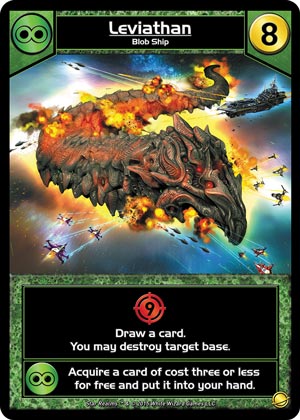
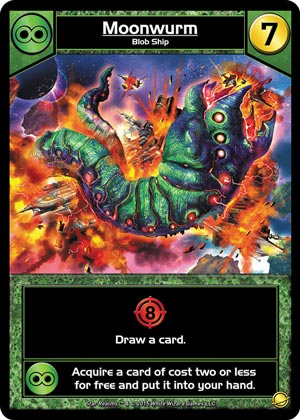
Technical Notes: The ally abilities of both Leviathan and Moonwurm will supercede the scenario rule, and correctly put the cards into your hand. Also, for the first time, the card’s reduced costs are taken into account for these and similar cards.
Client Update: The game was updated this week. The update includes the new United: Missions set, and you can read about that in this week’s blog post. The critical update for this week’s scenario is the reduced cost of cards is accurately represented while the cards are in the trade row, and abilities that reference card costs now refer to their current cost as opposed to their printed cost. This is a major change, and it is easy to miss. Now you know, and I hope this will help you win more games!
The Early Game: Trade or Scrap.
Colony Wars has many great, inexpensive trade-producing ships that you can purchase on turn one, even if you are going first. I very strongly advise that you put in more trade than you otherwise might, because you are likely to be facing fewer bases than normal. (See below.) Seeing fewer bases reduces the need to pick up early damage-producing ships, so you can focus on setting up your economy for a great midgame.
However, if you can pick up a card-scrapping card on your first turn, you should. I’m convinced you always should. I have yet to lose a game when I have done this – except the one time my opponent also did this on their first turn. Yes, scrapping is less powerful in Colony Wars than in the Core Set, but it is still plenty great.
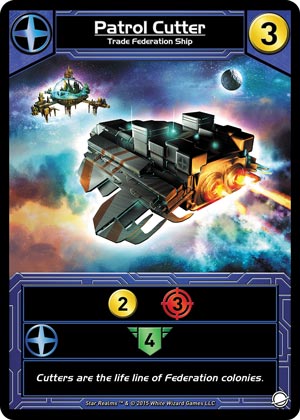
If I can’t begin the game with scrapping, I will hopefully start with Patrol Cutter. Because this format allows you to stack your deck, you will reliably generate 9 points of action (2 trade, 3 combat, and 4 authority) every time you go through your deck. This is an amazing value for just three trade! The authority gain should not be dismissed…
If you’ve read my articles this year, you know my basic take on formats where bases are not favored. Against an opponent who is not gaining authority, you getting 10 authority over the course of the game is usually enough to give you an extra turn and a final chance to win the game. If you are hoarding the blue cards, your opponent is unlikely to get them. And since you want trade for the entire game (as ships you purchase will be drawn on the very next turn), the value of the entire Trade Federation fleet goes up.
Usually Avoid Bases, and Create “The Clamp”
I will quote from my prior article, as this part of the strategy remains the same:
Since bases are generally not worth buying, they tend to clog up the trade row. You can use this to your advantage with a strategy I call The Clamp. There are three steps to this strategy:
- First, either get trade row scrappers into your deck, or be in the lead.
- Then, don’t purchase bases. You were likely avoiding bases anyways, as was your opponent.
- Finally, you want to end your turn with bases in all five spots in the trade row. (Ending with only four is good enough.)
This strategy greatly reduces your opponent’s options for improving their deck. Sure, they can buy a base, but every base they buy is a card they don’t get to take advantage of for several turns, whereas every ship they buy is a card they get right away.
If bases are not finding their way into the trade row, you can’t make The Clamp happen. But if the game starts with three bases, prioritize those Blob scrappers and give yourself a chance to lock the game down.
There are some bases I will usually buy: if a base will draw me cards, or costs 6+ (only 5+ this week), I will usually buy them if there isn’t a ship worth getting. The stats on the large bases should not be ignored, and they can force your opponent to find answers. I’ve also purchased Warning Beacon late in the game, when it would mean triggering an ally ability. (By buying it late in the game, I would be unlikely to draw it again.)
Another Path To Victory: “The Stall.”
One strategy I saw work this week was buying as many bases as possible, coupled with card-scrapping cards. There are extremely few cards with a “destroy target base” ability this week. If you can hit a critical mass of bases, and you thin out your starting cards, you can put 8 to 12 points of defense on the table every turn. This is a high-risk strategy, I believe, because you need just the right set of bases and scrappers to appear. It isn’t a likely route to win, but it is viable.
Cards of The Week
I’m changing how this section works. Most of the rare cards, the ones that appear once-per-deck, are great. But for planning, you should focus on the commons and uncommons. They should shape your gameplan.
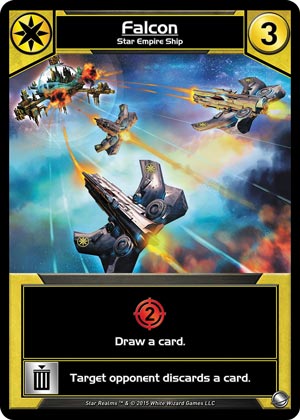
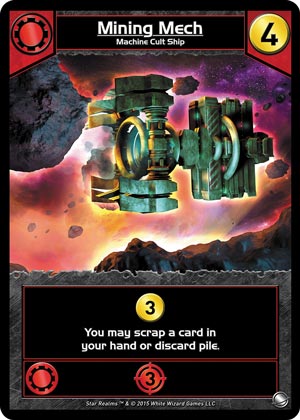
Here is a list of my top common and uncommon cards of the week. These cards make strong use of the scenario rule, or are better than normal for some other reason:
- Overall MVP: Patrol Cutter. Every time I begin the game with this card and any other blue card, I feel like I am going to win. The three times I have purchased two Patrol Cutters before my third turn was over, I won the game. (Buying a Patrol Cutter when you are likely to draw your other one next turn is a great feeling.)
- Blobs: Not the best week for them. I’ve won a game buying Parasite, then drawing a card, then playing it, then buying Plasma Vent to deal more damage and draw a card… but generally I’ve avoided the green team.
- Star Empire: Falcon and Orbital Platform. On-demand card draw is crucial this week.
- Machine Cult: Mining Mech. And on turns one or two, any scrapper.
- Trade Federation: Trade Hauler before the first shuffle. If you pair it with a Patrol Cutter, you can buy the best card on the trade row. Yes, I would rather have Patrol Cutter number 4 through 6, but what can you do?
Conclusion
Last week was a format where I feel luck played a large part in determining the winners. Skill was still the primary factor, but you could feel the power of random having an impact. This week, I feel the opposite is true. This week rewards skillful play due to its small card pool and its rewards for those who plan ahead.


Recent Comments